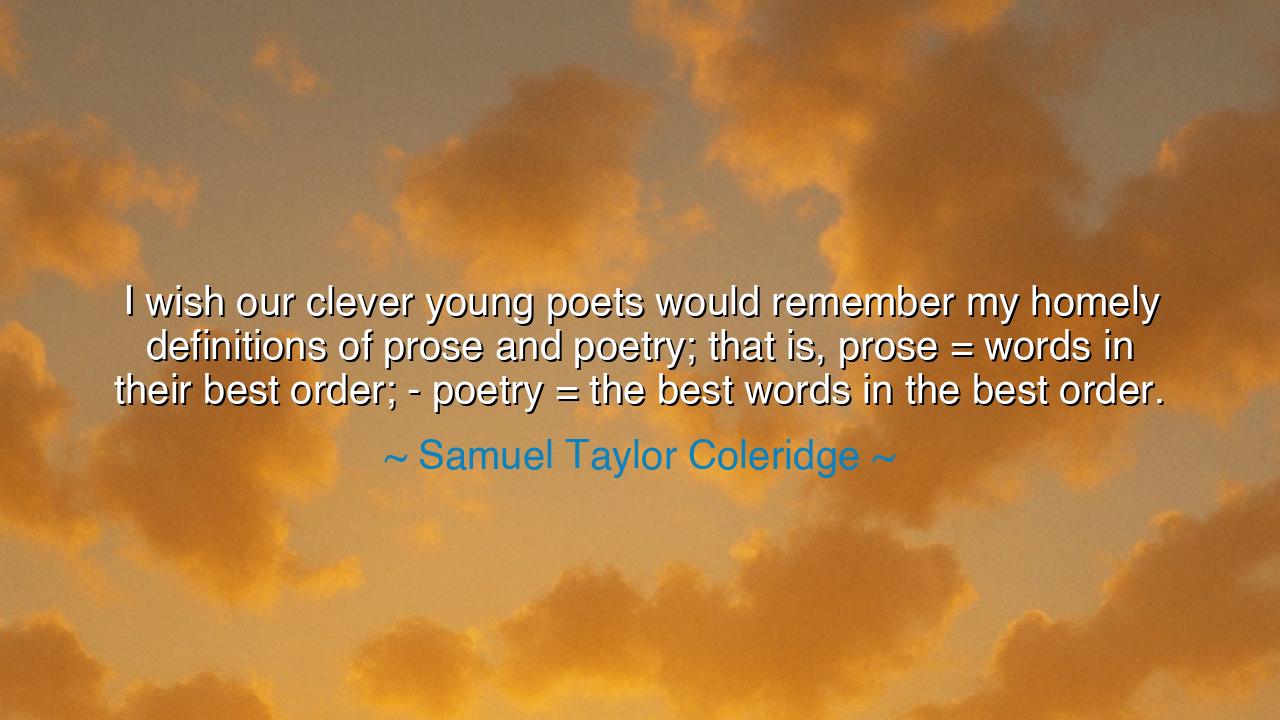
I wish our clever young poets would remember my homely
I wish our clever young poets would remember my homely definitions of prose and poetry; that is, prose = words in their best order; - poetry = the best words in the best order.






Host: The study was quiet, the soft rustling of paper the only sound in the room as Jack flipped through the pages of a book. Outside, the last light of the evening sun faded, leaving the world in soft shadows. Inside, there was a stillness that invited deeper reflection, the weight of ideas hanging gently in the air. Jeeny sat nearby, her eyes thoughtful as she watched Jack pause, a particular quote catching her attention.
Jeeny: (breaking the silence, her voice soft but deliberate) “You know, Samuel Taylor Coleridge once said, ‘I wish our clever young poets would remember my homely definitions of prose and poetry; that is, prose = words in their best order; - poetry = the best words in the best order.’”
(She looked at Jack, her voice calm as she considered the meaning of the quote.) “What do you think he meant by that? The difference between prose and poetry?”
Jack: (pausing, his voice thoughtful as he reflected on the words) “I think Coleridge is making a distinction between craftsmanship and artistry. Prose is about clarity, about arranging words to convey meaning in the best possible way. But poetry isn’t just about arrangement. It’s about precision — choosing the best words, those that evoke the deepest emotions, those that resonate in a way that prose doesn’t.”
Jeeny: (nodding slowly, her voice steady) “Exactly. Prose may have the best order, but poetry isn’t just about order. It’s about impact. Poetry has this weight, this ability to make each word feel significant, chosen not just for meaning but for its emotional depth, its sound, its rhythm. Poetry carries with it an energy that prose doesn’t always seek.”
Jack: (looking down at the book in front of him, his voice quieter now) “That’s the beauty of poetry. It doesn’t just say something. It makes you feel something in the way that no other form of writing does. It’s the best words in the best order because every word matters, every word is a conduit for something deeper.”
Jeeny: (her voice warm, understanding) “It’s the difference between just telling a story and weaving an experience. Prose might tell you what happened, but poetry makes you feel the weight of it, makes you see it in a different way. It’s not just information; it’s transformation.”
Jack: (smiling faintly, his voice more reflective) “I love that. Poetry doesn’t need to explain. It doesn’t need to be clear in the way that prose is. It’s more about what’s implied, what’s left unsaid. It’s about the beauty of the language itself, the magic that happens in the space between the words.”
Jeeny: (gently) “Yes, exactly. And that’s why poetry feels so much more alive. It’s like every word has its own weight, its own power. It’s not just about what’s being said. It’s about how it’s being said, how it lingers in the air after you’ve read it.”
Host: The room seemed to grow even quieter, the space between them filled with the understanding that Coleridge’s words had unlocked something simple but profound: that prose and poetry, though both expressions of language, existed in different planes. Prose was clarity, purpose, the best words in the best order. But poetry? Poetry was an art form that transcended clarity, reaching into something more intangible, more emotional. It was language elevated, chosen with precision, and placed with intention.
Jack: (finally looking up, a soft smile on his lips) “So, in a way, poetry isn’t just about the words. It’s about the space they create, the feelings they bring to life. It’s the most pure form of expression.”
Jeeny: (nodding, her voice full of quiet admiration) “Yes. It’s the essence of language itself. Poetry captures what can’t be said, what can’t be explained, and makes it real. That’s why it resonates with us in such a profound way.”
Host: The quiet in the room was now filled with understanding — the idea that the best words in the best order were what made poetry distinct, what made it special. While prose could be measured, calculated, even calculated in its purpose, poetry was an experience, a feeling, a space where language danced in a way that made us see the world differently.
Jack sat back, his mind settled with the simplicity of Coleridge’s insight. He didn’t just understand the difference between prose and poetry; he felt it — the power of poetry, the subtlety, the weight of each word, and the space it left behind.






AAdministratorAdministrator
Welcome, honored guests. Please leave a comment, we will respond soon